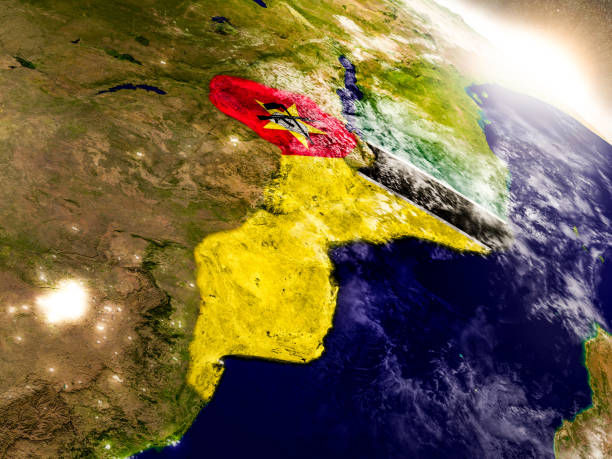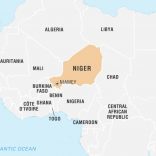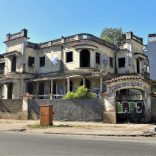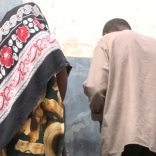Niger targets jihadist financing, kills 13 in illegal gold mine raids
Mozambique: Gas bubble bursts, Cabo Delgado debate; cocaine baron caught – News Reports & Clippings | Joseph Hanlon

- Also in this issue: Cocaine baron, no cash, Cabo Delgado
Gas bubble bursts
Half of Mozambique’s gas production will be delayed for five years, shooting a big hole in dreams that liquefied natural gas (LNG) would bail the country from its economic crisis. Exxon Mobile has again delayed its investment decision. The delay is likely to be five years, with no production until 2030 instead of 2025, according to Platts, the main oil industry newsletter (9 Apr, https://bit.ly/3a7zQmY)
ExxonMobile had planned to spend $27-30 bn. The final investment decision (FID) was to be announced last year but was deferred, with only an entirely artificial “intermediate investment decision” announcement to back Filipe Nyusi’s presidential campaign. Now the FID has been kicked into the far future.
ExxonMobile has planned 15.2 mn tonners per year (t/y) of LNG starting in 2025, half of the total production. Most of the money would have been spent on two gas liquification “trains” on the Afungi peninsula, on a shared facility with Total. Development of the other half of planned production continues – the joint ENI-Exxon floating 3.4 mn t/y plant now under construction and expected to start production in 2022, and the Total-operated 12.9 mn t/y onshore plant on Afungi now under construction and due to start production in 2024.
Globally, natural gas has been caught in a whirlwind of problems. As Saudi Arabia and Russia flood the market to try to put US shale gas and oil out of business, the price of Brent crude has fallen from $69 per barrel in January to $31 today. Gas prices are linked to oil, and global LNG prices have fallen from a peak of $11 per MMBtu in September 2018 to $4 in 2019 to just $2 now.
The global depression caused by Covid-19 will keep gas and oil prices low, causing major cuts in investment everywhere. Commentators such as Platts note that the on-going war in Cabo Delgado and attacks close to Afungi make investment there less attractive. And the Financial Times (7 Apr) noted that Exxon wanted to protect its large dividend to shareholders, $14.7 billion in 2019, so decided to make huge cuts in cash operating expenses and investment.
Brazilian cocaine baron caught in Maputo
“Fuminho”, who controls the cocaine trade in Mozambique, was arrested in Maputo Monday. The arrest of Gilberto Aparicio dos Santos at the Montebello Indy Village hotel was first revealed by Carta de Mocambique (13, 14 Apr). Carta reports that he has been travelling between Mozambique and South Africa for a decade, and is also a major supplier of cocaine to South Africa and, via Mozambique, to Europe.
Fuminho is apparently responsible for the increasing number of cocaine “mules”, mainly women, caught coming in at the airport. Most get through but some get caught (perhaps by agreement, to show there is some enforcement), and, Carta says, “in jail enjoy privileges that can only be obtained with bribes. Fuminho is believed to have a set of prison staff on his payroll.”
To have been active in Mozambique for this long means he must have a high level patron, who will want him extradited to Brazil quickly so that he is not interrogated in Mozambique and does not reveal his local network. But to detain and charge him in Maputo “would be a great coup against local impunity,” writes Carta editor Marcelo Mosse.
Fuminho has been wanted by the Brazilian police and by Interpol since 1999 after his escape from a Sao Paulo prison. When the heat became too intense, he moved to southern Africa and Mozambique, where he felt safer. Police sources told Carta that Fuminho arrived in Maputo in March from Bolivia. He was then apparently caught in Maputo by the sudden lockdown in South Africa, and was staying temporarily in an Indy Village hotel room with two colleagues.
Comment: Drugs are just another commodity traded by international networks, but in Mozambique they have two kinds of value chains. Some industries, like clothing, are highly decentralised and based on a network of local companies. Heroin is traded in that way. Heroin comes by dhow from Pakistan, passes through Mozambique to South Africa, and on to Europe. The heroin barons in Mozambique are Mozambican, often Asian origin business people also engaged in normal trade and import-export; for three decades they have operated with informal agreements with senior Frelimo party figures. One part of the agreement is that no heroin remains in Mozambique; much less heroin is consumed locally than cocaine, and that heroin mostly comes from different networks based in Tanzania.
By contrast, cocaine follows a different capitalist model, used for example by the big mining and gas companies, in which the entire value chain is controlled centrally, by head office. The establishment of Fuminho in Mozambique fits that model – local control by a cartel employee for cocaine, rather than a local subcontractor, as with heroin.
But in the era of Nhympine Chissano there was a struggle, with well placed Frelimo people demanding to be subcontractors, and the cocaine cartels refusing. Since then, a deal must have been reached with allowed Fuminho free movement and control of the trade. The people who made the deal would rather he was sent home and did not reveal his local patrons. jh
No cash for government for Covid-19
Not one penny in cash, health donors told the government. Donors will provide $48 mn for the Ministry of Health for Covid-19, and donors will do all the procurement. This is far less than the $700 mn Finance Minister Adriano Maleiane wanted, but close to what the Ministry of Health said it really needed. (Carta de Mocambique 13 Apr) Government is no longer trusted even to buy basic medical equipment. Purchases under way include 140 ventilators, 100 cardiac monitors, 1000 body bags, and other items.
The IMF on Tuesday (14 Apr) announced $15 mn debt cancellation for Mozambique to address the impact of Covid-19. The Jubilee Debt Campaign in London said “The IMF is sitting on $27 bn of reserves and over $135 bn of gold. It can afford to cancel more debt, and now is the time to do it.” On 15 April the G20 finance ministers announced a suspension of debt repayments from 1 May until the end of this year. But the debt will not be cancelled and must be repaid, with interest, in 2022-4.
Cabo Delgado
Yussuf Adam: ‘The fight against terror cannot be based on terror ‘
“The insurgents were created by an internal political and administrative process that gave them no voice, that discriminated against them, that marginalized them, and made their socio-economic characteristics, poverty, etc. extreme,” warns Yussuf Adam, a Universidade Eduardo Monlane professor and one of the most respected long-term researchers of Cabo Delgado. “They were marginalized by the State. Factors such as corruption, nepotism, the lack of democracy, freedom of expression, and a lack of rigorous justice further marginalized these groups. Instead, they found armed violence and support from throughout the world for that form of struggle.”
“We need to develop a response strategy that is not only based on the use of force, torture, fictitious judgments, and repression of journalists and freedom of expression,” he argues. “The fight against terror cannot be based on terror. There is a need for a military response but also for mobilization systems that remove their ability to become fish in water,” he explains in an article written on the Facebook page Lutar por Cabo Delgado on 14 April. The article in English and Portuguese is on: https://bit.ly/Adam-Lutar1
“Religious and ethnic explanations are a smoke screen”, Adam says in an interview in Canal De Mocambique (1 Apr) “There are Mwanis, Macondes, Angonos, etc involved in the insurgency. There are Christians. Catholics, Muslims, Protestants and even animists.”
The insurgents “want part of the benefits of the investments in Cabo Delgado. They want fair payment for land that is expropriated. They want jobs.” In Mocimboa da Praia and Palma, people don’t like the “Maputecos” – the pejorative term for people from the south. “The targets of attacks in Mocimboa were symbols of the institutions that the local people do not like or have given them trouble: police, army, finance, etc. Curiously, they also destroyed businesses and investments of the rich of Mocimboa, but not of ordinary traders and business people.” Younger civil servants and business employees stayed in Mocimboa during the attack, frequently moving houses and apparently protected by local people, Adam added.
Many soliders fled, leaving behind their uniforms and weapons. “And when the soldiers fled in Mocimboa da Praia and Quissanga, the people applauded.” But some fought, and between 60 and 120 soldiers were killed [in Mocimboa] and were buried in mass graves, without their identify “dog tags” which were sent to their families. The entire interview, in Portuguese only, is on: https://bit.ly/Adam-Canal
Bishop Luiz Fernando Lisboa: without jobs, resources are a curse
“It is very sad that this is happening in a province so rich in resources such as natural gas, precious stones and rubies. … These resources should not continue to be a curse for the people, as they have been until now,” said the Pemba Catholic Bishop Luiz Fernando Lisboa, in an interview with CDD (Centre for Democracy and Development, 12 Apr) on https://bit.ly/CDD-Bispo-1 in Portuguese only.
“The population must be consulted and heard. The population needs to be part of the processes and not a group of five or six people who are often co-opted, bought – they speak on behalf of the population, but have no power or legitimacy to speak on behalf of the people. Often the population is left out. If they don’t involve the population, if they don’t bring jobs to the youth, the resources end up becoming a curse.”
“It is necessary to invest massively in youth, because if we do not give opportunities to our young people, they will follow the path they are following now.”
“Cabo Delgado today lives in a situation of isolation; it does not seem that we are part of Mozambique. We feel isolated, abandoned,” the Bishop continued. “The climate of fear is widespread. And fear is not unfair. We all follow that some journalists who tried to cover the attacks were arrested.”
And the war is getting worse. “It was unthinkable to attack Mocimboa da Prais, which is a town with a large contingent of military personnel, but they attacked and occupied it. They attacked the places where the police and the military were camped, took weapons, took cars, took food. The entire northern area of Cabo Delgado is a powder keg. The population is agitated and in almost all districts people are fleeing to safe places. For those who cannot afford to leave, the solution is to sleep in the bush.”
Sergio Chichava: Who is the enemy?
“Evidence on the ground shows clearly that the country faces the presences of a radical Islam group that want to impose Sharia”, and this is reinforced by the attacks of 23 and 24 March in Mocimboa da Praia and Quissanga, writes Sergio Chichava, scientific director if IESE (Institute of Economic and Social Studies) in Maputo, in Ideas Bulletin 127 published 13 April, in Portuguese only on http://www.iese.ac.mz/ideias-127/
But the roots of that enemy and its history are less clear, and in the paper he looks at four different explanations that have been given by the government: 1. Individuals who want to install an Islamic state, 2. artisanal ruby miners displaced by Gemfields (some of whom, Chichava confirms, have joined the insurgency), 3. business people based in Beira (which seems not to have been backed up), and 4. vaguely defined external forces.
Palma journalist still missing
Palma community radio journalist Ibraimo Mbaruco is still missing after he was kidnapped, apparently by military, on 7 April. The last anyone heard from him was a short text message to colleagues saying he was “surrounded by soldiers”. On 14 April, Cabo Delgado police spokesperson Augusto Guta said the police, secret services SISE, and “all the security and defence forces” had been unable to locate Mbaruco.
Also on 14 April, police in Pemba detained Hizidine Acha, a reporter for O Pais newspaper and the STV television station, forcing him to delete images of police beating and whipping people in the Paquetiquete neighbourhood of the city. Spokesperson Guta told Zitamar that the situation had been a misunderstanding and that the police were not beating or whipping people. (Zitamar 15 Apr)
Other Cabo Delgado news
“Jobs don’t exist”, explained the General Commander of the Mozambican police force, Bernadino Rafael, on STV (14 Apr). Young people being offered jobs “are being tricked so that they enter the labyrinth of crime” by joining the insurgents. He said that most of the insurgents are Tanzanias, but some Mozambicans had joined because of offers of jobs. “There are no zones that can be said to be in the hands of the insurgents”, he insisted. “What does exist are areas that are prone to incursions by the criminals” – where there is an “alteration of public order”. (AIM 14 Apr)
The Pope in his Easter message said: “The crisis we are facing should not make us forget the many other crises that bring suffering to so many people. May the Lord of life be close to all those in Asia and Africa who are experiencing grave humanitarian crises, as in the Province of Cabo Delgado in the north of Mozambique.”
Is working day and night enough? “I want to assure all Mozambicans that the government will continue to work, night and day, using all that is in its power to defend the population of the Cabo Delgado districts plagued by these violent attacks,” said President Filipe Nyusi on 13 April. “We call on the populations not to accept information intended to divide Mozambicans and to create hatred between the people and their Defence and Security Forces.”
Map of incidents this year to 12 April, from Jasmine Opperman, shows clearly three concentrations – Mocimboa da Praia, Muidumbe, and Macomia-Bilibiza-Quissanga. https://twitter.com/Jasminechic00/status/1250026656724631553/photo/1
Five people died in the Quirimba attack on 10 April; three drowned as they tried to escape. One of the victims was burnt alive, while the fifth was shot dead. About 60 people were taken hostage, perhaps as a shield against the helicopter attack, but released later. (Carta de Mocambique 13 Apr).
There was no massacre in Xitaxi we now believe. In the series of raids on Muidumbe on 5-7 April (this newsletters 479, 480) Savana (10 Apr) reported a massacre with 50-70 dead. We now believe this was hugely exaggerated in reports by local people. It appears to be correct that liberation war veterans attacked a band of insurgents and killed up to 30, and that the insurgents retaliated with a renewed attack on Xitaxi, which was done with some violence and anger and significant destruction. But we believe the deaths were closer to the 14 reported by Zitamar, and not the very large number reported by Savana.
The historic Nangololo mission was attacked and vandalised and partly burned as part of the 5-7 April raids in Muidumbe. The mission is in Muambula, the former district headquarters before it was moved to Namacande, and insurgents were still occupying the mission on 11 April. All the foreign missionaries there fled to Mueda, then Montepuez, and then Pemba. Southeastern parts of Muidumbe district are low and occupied by a mix of Mwani and Maconde speakers. The attacks started there but then moved up the road onto the Mueda plateau and thus were a direct attack on a Frelimo stronghold. Nangololo produced many Frelimo leaders and thus its occupation for several days was a strong statement by the insurgents.
Creating fear and paranoia is a goal of any insurgent group, and as insurgents move through Bilibiza and Quissanga the wave of fear goes ahead of them.
On Ibo island on the night of 11-12 April rumours spread that insurgents were approaching the island for an attack, causing panic among local residents. Security forces then reportedly stopped a boat believed to be carrying insurgents, but which in reality was carrying local fishermen. Security forces reportedly fired shots during the incident though no injuries were reported. (Intelyse 13 Apr)
In Nacuta, Metuge District, just across the bay from Pemba, two 2 suspected insurgents were attacked by civilians on 5 April; one man was killed, while the other was badly injured. This links to rumours and fears in Pemba of an attack. (Intelyse 13 Apr)
Eric Prince never goes away, but never does anything. Prince has tried to sell military and mercenary capabilities around the world. After the Russian government linked Wagner group failed in Cabo Delgado, “Prince sent a proposal to the Russian firm offering to supply a ground force as well as aviation-based surveillance”, according to The Intercept, the investigative journalism group founded by Glenn Greenwald.
https://theintercept.com/2020/04/13/erik-prince-russia-mercenary-wagner-libya-mozambique/
It is part of Prince’s continuing efforts to get a foothold in Mozambique, which included bringing helicopters to Nacala last year in the unsuccessful expectation of being given a big role. We reported on 19 December (this newsletter 465) that his Frontier Services Group (FSG) had withdraw from the joint venture with Empresa Nactional de Hidrocarbonetos (ENH), intended to supply logistics and security for Cabo Delgado gas projects. Two years ago Prince signed a joint venture agreement with Ematum, the tuna fishing company set up as part of the $2 bn secret debt, but which has never caught any fish. Prince said he would have the company fishing last year, but instead quietly withdrew. Prince established FSG Mozambique, which in turn owns 49% of FSG Mozambique Seguranca; the other 51% owned is owned by Lucilio (Tchenguela) Matsinha, son of the revolutionary war veteran and former security minister Marianao Matsinha. Prince set up the private security company Blackwater which sent contract security workers to Iraq and Afghanistan, and claims Russian, Chinese, and US high level links. Prince was an adviser to the de facto ruler of the United Arab Emirates, Crown Prince Mohammed bin Zayed, known as MBZ, for more than a decade, when the close ally of the US intervened militarily in several regional wars in the Middle East and Africa. He also had a contract worth hundreds of millions of dollars to create and train a presidential guard for the royal family, but was later removed for mismanagement, reports the Intercept.
By Joseph Hanlon












Leave a Reply
Be the First to Comment!
You must be logged in to post a comment.
You must be logged in to post a comment.